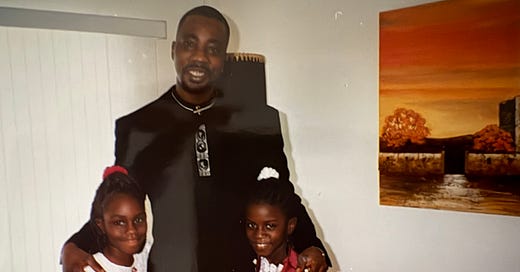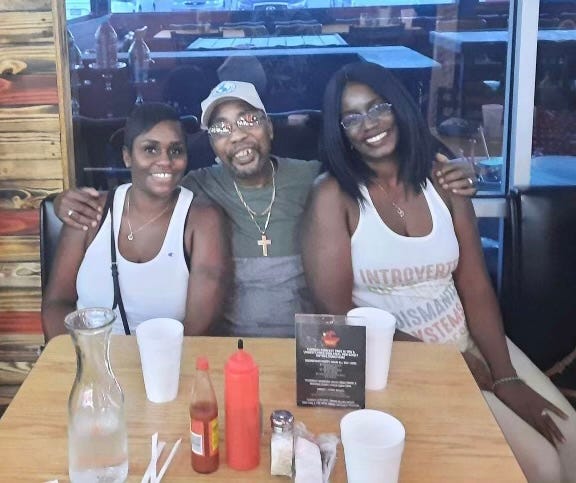Father's Day, the Distance Between Us, and What Love Looks Like Now
Messy Truth Reflection on Father's Day
Here’s the truth: Father’s Day has never been simple for me. Father’s Day always hits a little different when your relationship with your dad was complicated. Not absent. Not unknown. Just… layered. My relationship with my father wasn’t built on bedtime stories or daily routines. It wasn’t warm and steady like I used to wish it could be. It was complicated. Unsteady. Marked by silence and distance, presence and absence. For a long time, I didn’t know what to do with that.
My parents split not long after I was born, though from what I’ve been told, their relationship had already been falling apart—riddled with drug abuse, domestic violence, physical fights, and pain neither of them had the tools to manage. Most of my earliest memories are of them arguing. Then suddenly, it was just my mom and us, while my dad lived in Chicago and we stayed in Texas.
From then on, to me, he was mostly just the voice on the other end of the phone. The man I visited every holiday (first by Greyhound bus, then by plane). I knew my father, technically. I mean I could point him out in a crowd, but I didn’t feel known by him. He wasn’t a constant presence in my childhood. He didn’t raise me. He didn’t know what I loved, what scared me, or the names of my friends. He wasn’t the one I called when life broke open. He was just someone I saw at Christmas and in the summer, someone I occasionally spoke to when the phone calls went through.
All of that changed when my sister and I moved to Zion, Illinois, to live with him and his new wife. It wasn’t a great experience, but it was the first time I was around my father consistently. Looking back now, I know it couldn’t have been easy for him—suddenly becoming a full-time father to two daughters while trying to make a blended family work. Not long after, my mom was sentenced to two years in prison. I don’t think any of us had the emotional resources to handle what came next. During that period, both my father and his wife turned back to drugs to cope. And even though I understand now that addiction is a response to pain, back then it just felt like abandonment all over again. I lived with anxiety. I shut down emotionally. Eventually, I was placed with my aunt as a foster child. Not long after, I was sent back to Texas.
Another chapter closed.
From there, my father and I struggled. I was tired of feeling let down and hurt, so I pulled back. Our connection became shallow, and then nonexistent. I remember visiting Chicago once as a teenager and reluctantly agreeing to see him, only for him not to show. Later I found out he had attempted suicide. That wrecked me. Not just because of what happened but because I didn’t know how to hold the grief, the guilt, and the rage all at once.
Our relationship limped along through my college years, marked by distance and occasional conflict. When I got pregnant with my first child, he reached out on Facebook, and I unleashed everything I had been holding in. Every word I swallowed as a child came flooding out of me. At the time, I thought I was being fiercely protective of my unborn baby. But looking back now, I realize I was speaking from rage, the unhealed kind. You know, the kind that bubbles up when your pain has never been witnessed and your silence has gone ignored for too long.
Over the years, we tried to reconcile, but nothing stuck. The desire was there, but so was the fear. It was a dance of wanting connection but not knowing how to trust it. Wanting closeness but flinching every time the past brushed up against us.
Then Christmas 2015, he asked if he could send gifts to my daughters. It was the first time he had ever done anything like that. It was a small gesture, but it it was a pivotal moment. For the first time, I felt like he was extending a hand—not just to be forgiven, but to show up in the life I had built. By then, I had lived enough to know this: I could love people for who they were and trust myself to walk away the moment their presence became a threat to my peace.
That was the turning point.
After that, our relationship deepened—gently, slowly, almost cautiously. We started talking more. Phone calls. Facebook messages. Little conversations about nothing and everything. He never pushed. Never demanded. He was just there—showing up in the small, consistent ways I had needed my whole life.
I don't know exactly when it happened, but I started to understand my father, and more importantly, I felt he understood me. He didn’t take offense when I pulled back. He knew why I kept people at bay. He respected the space I needed and was there whenever I reached out.
In Summer 2022, he planned a road trip to Texas to meet all of his grandchildren. He stayed with me and my sister. That trip was everything. We cooked. We laughed. He held my daughters like he was trying to memorize their faces. Watching him play with my youngest, seeing her fall in love with a grandfather she’d just met—it was healing. Not perfect, but beautiful.
During that time, I was also going through one of the hardest seasons of my life, carrying the weight of solo parenting, the aftermath of my husband’s affair and the child born from it, the tension with my mother and sisters, and the silent battles I fought daily with anxiety and depression. My father didn’t try to fix any of it. He didn’t lecture or offer spiritual clichés. He just held space. Quiet. Consistent. Present.
I realized how alike we were.
He turned to drugs to numb the pain. I turned to herbs to heal mine.
He dreamed of land and animals, just like me.
He stayed quiet until he couldn’t.
Felt everything, deeply.
Loved hard, even when he didn’t know how to show it.
Our last conversation was simple. He called me on his lunch break just to comfort me because my dog had died. He had met my dog and loved him. He just wanted to check in. To be there.
Two weeks later, my father died of a brain aneurysm. This man—who had survived so many things he shouldn’t have, who doctors had once given up on—didn’t survive this.
When I got the call, something broke in me. I cried for hours. I didn’t cry because we never had a relationship. I cried because we finally did.
We had made peace.
We had started over.
We had taken the broken pieces and built something real.
I wept for the memories he would never get to make with my daughters.
For the future trips that would never happen.
For the parts of myself I had just begun to share with him.
Mostly, I wept because I realized the unconditional love I thought I never had—from either parent—had always been there, in him.
He saw me —the real me, not the version who performed, or pleased, or protected.
Just me.
It just took me a long time to see it. Now, when I look in the mirror, I am proud to see so much of him reflected back in my eyes. I am my father’s daughter.
Here’s the Messy Truth:
Not all love stories are linear.
Some begin late. Some break and rebuild a hundred times.
Some never stop hurting, yet they still manage to heal.
My father didn’t always show up, but when he finally did, he came as he was.
That version of him—the one who tried, who listened, who loved without demanding—will live in my heart forever.
This Father’s Day, I honor the man he became.
The father he learned how to be.
The healing we made possible together.
Stay messy,
Michelle
About the Author:
Michelle is a mother, writer, herbalist, and former educator who believes in telling the truth—even when it’s hard, even when it hurts. Through her blog, Messy Truths & Sacred Roots, she writes for the women carrying too much, feeling too much, and ready to choose themselves. She believes in root work, sacred boundaries, and the quiet power of reclaiming your story—one messy truth at a time.







Very relatable. You have a unique way of looking at the whole picture. Again, I appreciate you 🥰